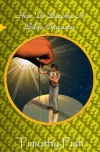
And Thy House
Extra Feature: High Res Image

History of
Cane Creek
Association
by D. F. Magruder
Christians and Banned Books - Part 7
Written By: Timothy Fish Published: 10/5/2007
C. S. Lewis wrote the Narnia Chronicles back in the 1950’s. The very first one was called The Lion, the Witch and the Wardrobe. Four children traveled through a magical wardrobe to a world that was very different from their own. While they are were there, both they and they readers of the book learned lessons that could be applied to the real world. No one disputes the lessons that can be learned, but some members of the Christian book police take issue with the book and would like to see it banned because of its use of magic and because it has a witch. Even the children are involved with working magic.
The debate over this has been going on for some time and through I am comfortable with my position on the subject, there are people who disagree with that position and we are unlikely to be able to sway each other to the other point of view. There are two major points of view.
All Magic is Wrong
As we saw yesterday, the Bible prohibits the practice of magic. Magic here being those things that seek to invoke the power of the supernatural to do things that are impossible in the natural world or things that circumvent the will of God. One view concerning magic in fiction is that because magic is prohibited in the real world it should not be used in the fictional world. The people who believe this way make a good argument that when things, such as this, are portrayed in a good light within the fictional world children may be enticed to experiment with them in the real world. A child may not realize the difference between a witch who has amazing powers in the fictional world and a witch who is a servant of Satan in the real world because she hopes to have the power to change the world supernaturally.
As I have said, they make a good argument, so I am not going to say that they are wrong. I may, someday, decide that I agree with them more than I currently do, so I am not going to burn my bridges behind me on this subject, but aside from the legalistic side of me wanting to step in, I do not totally agree with this point of view.
It Is Just Fiction, Get Over It
I do not agree completely with this point of view either, but I do tend to lean more in this direction than the other. In this point of view, the fictional world is seen like a sandbox where one’s imagination can run free. Since it is fiction, we can do anything we want and it does not matter. We can even create imaginary worlds where we are not bound by the laws of God, so we can have witches and not violate the laws of God.
One of the great things about fiction is that is allows us to explore possibilities and to learn lessons from things we have not experienced. Jesus used fiction in some of his teaching. Some of the visions that we are told of in the Bible are very symbolic and though they point to real things, they are still fictional.
The problem with saying that it is just fiction is that by doing so we are ignoring the powerful influence that fiction has. Yes, we can use fiction to explore possibilities. Yes, we can create imaginary worlds in which the laws of God are different, but in doing so we should make sure that we are not violating the principles of God.
When God told us that he did not want us to be involved with people who do the things we covered yesterday; he was giving us more than a rule that we must follow but a principle to live by. I think this principle is that he does not want us trying to circumvent his will. Let’s take a look at a possible story in which there is a young wizard. We know that it is God’s will that children obey their parents, so lets look at two possibilities.
Against the Principles of God
Todd, the young wizard, knew what he would hear as soon as he walked through the door. “Go do your homework,” his mother would say. It was not something that he wanted to do. There were other things that he wanted to do. He opened the door and saw his mother open her mouth, but he was much too quick for her. He zapped her with his wand and nothing came from her mouth. That would teach her to tell him what to do.
It that is all there is to the story or if we play this up as being a good use of magic then it is clearly a violation of God’s principle. Whether by magic or some other means, we are encouraging rebellion, but what if we look at the story from a different angle.
For the Principles of God
Todd’s mother knew that if she did not tell him to do his homework the moment he walked through the door then he would never do it. She heard the door open and saw him come in. As she opened her mouth he waved a stick at her. She pulled another stick from her pocket. “Are you looking for this?” she asked. Todd was shocked to see that it was her who held his wand and all he had was a useless stick. “Now, go do your homework,” she said as she waved the wand at him. Unable to resist her command, his feet carried him to his room where he pulled out his books and went to work.
In this second version, the use of magic is still there, but instead of it being used in a way that violates the principles of God, it is being used in a way that encourages obedience to the principles of God. From a pure, legal point of view, it can still be said that even this second version is a violation of the law of God because it involves a couple of wizards, but this version creates an imaginary world were a wizard is not the type of wizard referenced in the Bible and the principles of God are not violated.
Different Definitions
In imaginary worlds, we often use terms that are used in the real world in a different way. Such is the case with the term wizard in the two stories above. While a person in the real world would probably need a familiar spirit in order to be a wizard, these people in the imaginary world do not. It could be argued that this is still putting wizards in a good light that God did not intend, but at the same time, the characters in the second version are probably nothing like what God considered to be an abomination.
The Debate Will Continue
This debate is not going to end anytime soon. Some people will continue to take issue with the use of magic in fiction while others will continue to enjoy it being there. All I know to say is that everyone must decide for himself what is right for him and his family.
www.timothyfish.com



